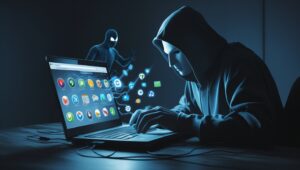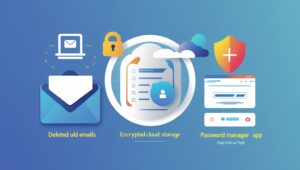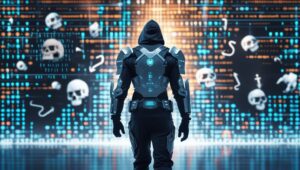You saw the headline and felt your stomach drop.
184 million passwords exposed. Google. Apple. Facebook. Maybe even your bank.
You’re not some tech wizard. You just use the internet to live your life—email your boss, check your bank balance, message friends, maybe shop online now and then. And suddenly, it feels like your digital world isn’t just vulnerable—it’s already been broken into.
Here’s the thing: you’re not being paranoid. You’re being realistic. Massive breaches like this aren’t once-in-a-decade events anymore. They’re constant, and the tools used to carry them out—like infostealer malware—are getting more powerful and more invisible by the day.
I’m here to walk you through what actually happened in this breach, why it matters to people like you, and what you can do—without needing a computer science degree—to protect yourself. You’ll walk away with a clearer understanding of today’s threats and practical ways to stay safe online.
Because here’s the truth: you don’t need to be a tech expert to take cybersecurity seriously. But you do need to act.
What Actually Happened?

A cybersecurity researcher named Jeremiah Fowler recently discovered an unprotected database containing over 184 million login credentials. We’re talking about linked to major platforms like Google, Apple, Microsoft, Facebook, and Snapchat.
But that wasn’t all. The database also included sensitive information from bank accounts, health services, and even government portals.
The data wasn’t stolen through one big hack. It was collected by infostealer malware—malicious software that quietly sits on your device, pulling data from your browsers, apps, and saved files without you even noticing.
Once stolen, this data is packaged up and sold on the dark web, where it can be used for identity theft, fraud, or targeted scams.
The worst part? You wouldn’t even know it happened.
What Is Info-stealer Malware (And Why Is It So Dangerous)?

Imagine a silent pickpocket who slips into your home, copies your passwords, bank info, and personal files, and leaves—without moving a thing.
That’s how infostealer malware works.
These programs often come bundled with pirated software, fake browser extensions, dodgy downloads, or even innocent-looking email attachments. Once installed, they dig through:
- Your saved browser passwords
- Auto-fill information (like your home address or credit card)
- Cookies that keep you logged into websites
- Documents stored on your desktop or downloads folder
Because they don’t always crash your system or display errors, you might never know your device was infected.
Why This Affects You (Even If You Think It Doesn’t)
You might be thinking, “But I don’t store sensitive stuff on my computer.”
Here’s the reality: if you’ve ever logged into your email, bank, or social media on a device, there’s a good chance some of that data is sitting in your browser.
If you use the same password across different websites, one leak can open the door to everything. That old email from your bank with your account number? Still in your inbox. That scanned copy of your ID you sent to HR? Still in your “Sent” folder.
Cybercriminals don’t need much to wreak havoc—and they’re betting on you being unprepared.
Three Lessons From This Breach

- Stop storing sensitive documents in your inbox
Your email account is a goldmine for criminals. Old tax returns, ID scans, bank info—all there for the taking. If you need to store these, use an encrypted cloud storage service instead. - Use a password manager
Password managers generate strong, unique passwords for each website and store them securely. So even if one site is compromised, your other accounts stay safe. - Delete what you don’t need
Got five years of emails you never read? Clean them out. Got old apps or files you don’t use? Get rid of them. The less you store, the less there is to steal.
Cyber Hygiene Habits You Can Start Today
Here’s a quick checklist to keep yourself safer starting now:
✅ Use two-factor authentication (2FA) – Adds an extra layer of security to your logins.
✅ Avoid reusing passwords – Use a password manager to keep track.
✅ Update your software regularly – Security patches exist for a reason.
✅ Be suspicious of links and downloads – If you didn’t ask for it, don’t click it.
✅ Back up important files – In case ransomware hits, you won’t lose everything.
✅ Run antivirus scans weekly – And keep your protection up to date.
✅ Review your digital footprint – Search your name, old accounts, and clean up what’s out there.
Staying One Step Ahead

Cybersecurity isn’t just an IT problem anymore. It’s a life skill.
No, you don’t need to become paranoid. But you do need to become proactive. Because cybercriminals are counting on your convenience. They’re counting on you being too busy to check. Too trusting to change. Too overwhelmed to take action.
You don’t need to overhaul your life. Just start with one small step today. Because in a world where your password can be stolen and sold before your morning coffee? Doing nothing isn’t an option anymore.
“Cybersecurity isn’t complicated. Ignoring it is.”
For the ones who live in the logs and fight in the firewalls — this breach is your reminder: education is power, but vigilance is armour.
Visit Digived Academy to learn more about our Cybersecurity Training programs and start your journey as cybersecurity professional today.
Contact Us
For more information about our courses, schedules, and enrolment process, visit our website or contact us at.
Website: www.digived.academy
Email: admission@digived.academy
Phone: +91-9019299971



